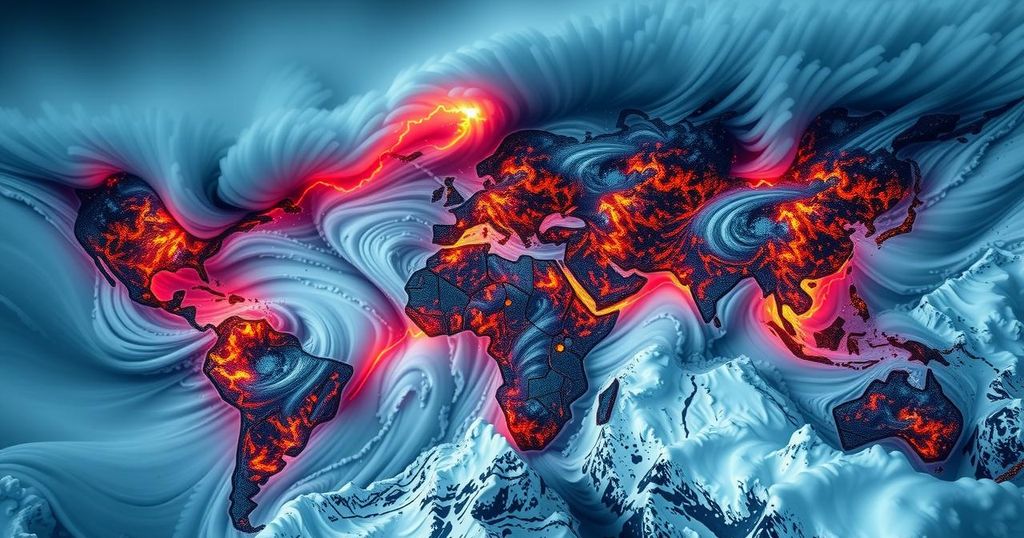In 2024, the world experienced unprecedented extreme weather driven by climate change, with record-breaking heat and severe storms affecting millions. Dangerous heat intensified suffering among vulnerable populations and resulted in drastic impacts on agriculture and infrastructure worldwide. The implications highlight the urgent need for preparedness and proactive response to the increasing frequency and intensity of weather-related disasters.
The year 2024 has ushered in a series of severe weather events, which can be attributed to the accelerating impacts of climate change. This year is projected to be the warmest on record, resulting in the global population facing an extra 41 days of dangerous heat. An official analysis conducted by the World Weather Attribution (WWA) group identified a range of crises experienced from Brazil to Indonesia due to extreme temperatures, droughts, and storms. Reports indicate that vulnerable groups, such as the elderly and those with pre-existing health conditions, have been disproportionately affected by the rising temperatures amid prolonged heatwaves.
As many regions struggle with extreme heat, the Amazon basin has encountered alarming conditions due in part to the El Niño climate phenomenon. Rainfall has significantly diminished in parts of South America, leading to dangerously low water levels in the Amazon River, contributing to school closures and agricultural disruptions. This decline in rainfall heightens concerns regarding biodiversity loss and the ecological balance vital for our planet’s health.
Conversely, the Philippines confronted an unprecedented influx of storms, with a record six typhoons striking within just 30 days. The destructive consequences of these storms included floods and landslides, resulting in over 1,200 fatalities across Southeast Asia. Hardy evidence suggests that, while the sheer number of storms may not directly correlate to climate change, the heightened intensity of hurricanes can be traced back to warmer ocean temperatures fueled by climatic alterations.
The United States faced its own tribulations with two severe hurricanes, leading to over 260 deaths and significant financial losses, attributed to elevated temperatures in the Atlantic Ocean. Infrastructure failures exacerbated flooding in several African nations, demonstrating the urgent need for improved weather preparedness measures.
The stark realities of 2024’s extreme weather underscore the vital discourse surrounding climate change and its cascading effects on global health and infrastructure, compelling nations to foster proactive strategies against future disasters.
The discussion of climate change has gained urgency amid observable shifts in weather patterns globally. The year 2024 has exacerbated concerns regarding extreme temperatures, with a multitude of adverse weather phenomena occurring across continents. The scientific community has indicated that climate change significantly influences these occurrences, specifically elevating the intensity and frequency of severe weather events. The ramifications of these shifts disproportionately affect vulnerable populations, stressing the need for comprehensive weather preparedness and response systems, which are imperative to mitigate loss and suffering in future scenarios.
The extreme weather patterns witnessed in 2024 exemplify the critical challenges that climate change poses globally. From record heat and droughts in the Amazon to catastrophic storms in the Philippines and the U.S., the implications are profound and far-reaching. Vulnerable demographics, particularly in precarious living situations, encounter heightened risks, necessitating immediate action for improved disaster preparedness and climate resilience. Without urgent and concerted efforts to address these climatic changes, humanity faces dire consequences.
Original Source: www.bbc.com






